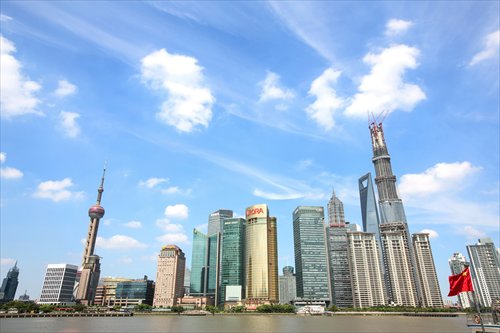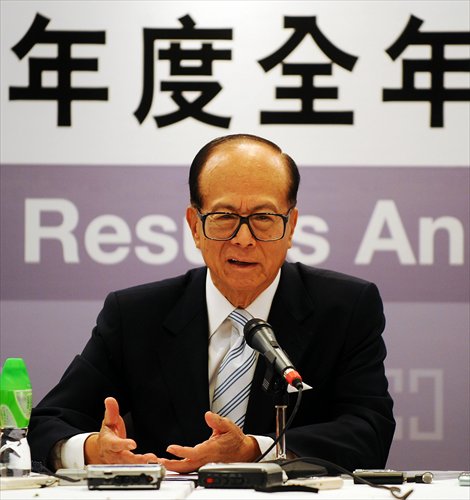Li's logic

The skyline of the Lujiazui Financial District with the Oriental Pearl TV Tower (left) and other skyscrapers in Pudong, Shanghai, on August 15, 2013 Photo: IC
China's commercial real estate market in its first-tier cities is so hot that it's a dream for property developers to own an iconic tower in Shanghai's Pudong New Area or Beijing's CBD.
However, one real estate tycoon is bucking the trend. In the last few months, Li Ka-shing, Asia's richest man, has sold nearly 10 billion yuan ($1.64 billion) worth of commercial real estate properties in top locations in the Chinese mainland.
In mid October, Li sold a 31-story office tower in Shanghai's financial hub of Lujiazui in Pudong. Roughly two months before that deal, he sold a 71,000-square-meter shopping mall in Guangzhou, capital of South China's Guangdong Province.
Li, known as "China's Warren Buffet," is considered to be a business mogul who can predict the future of the mainland's commercial property market.
Therefore, his recent sell-offs have rung alarm bells for many industry insiders. "The intelligent Mr. Li Ka-shing is selling off his properties in Beijing and Shanghai. This is a signal. Be careful!" Wang Shi, chairman of the board of China's largest residential real estate developer, China Vanke, said in a recent Weibo post.
Although some are worried that Li's move might indicate a downturn in China's commercial property market, experts contacted by the Global Times said there is no likelihood of a sharp decline any time soon.
Strategic move
The 31-story Oriental Financial Center in Shanghai, which was owned by Li's conglomerate Hutchison Whampoa and affiliate Cheung Kong Holdings, was sold to Hong Kong-listed China Everbright Ltd, HYZL Development Co and HYZL Investment Co for HK$8.9 billion ($1.15 billion), according to a stock filing released by Hutchison Whampoa on October 18.
In late August, Li Ka-shing also sold Metropolitan Plaza - a four-story shopping mall that was opened in Guangzhou late last year - for HK$3.27 billion, the company said.
Li Zhanjun, research director at Shanghai-based E-House China R&D Institute, told the Global Times Tuesday that the two sales do not indicate that China's commercial property market is about to regress.
"It is just a company-level strategic move," Li Zhanjun said. "Li Ka-shing wanted to sell his China properties to put the money into places with higher returns."
Li Ka-shing has been heavily investing in Europe in recent years. Hutchison Whampoa purchased the Irish subsidiary of Spanish broadband and telecommunications provider Telefonica SA in late June for $1.1 billion.

Li Ka-shing
Li's companies paid $24.09 billion to purchase at least 10 companies and projects outside of the mainland since 2010, according to a Nandu Daily report in August. More than 90 percent of the money was spent in Europe, the newspaper reported.
Zhang Jingjing, senior research manager at the Beijing office of Knight Frank, told the Global Times Tuesday that Li Ka-shing is especially eyeing the infrastructure market in the UK.
"After two decades of fast growth, the appreciation potential of China's property sector is narrowing. At the same time, European governments are starved of money, so it is cheap for Li Ka-shing to invest in infrastructure there," Zhang said.
Property still hot
The commercial real estate markets in China's first-tier cities including Beijing and Shanghai will still be on the rise in the next three to five years, said Zhang Hongwei, research director at Shanghai-based property consultancy ToSpur.
"The transaction prices of commercial properties will keep rising as demand remains strong in the next few years, yet the rent could drop slightly as more new buildings enter the market," Zhang Hongwei told the Global Times Tuesday.
According to figures provided to the Global Times by Knight Frank Tuesday, the rental price of prime office space in Beijing has increased by 32.4 percent in the last two years to reach 384 yuan per square meter a month in the third quarter of 2013. Monthly rental prices in Shanghai's Pudong New Area reached 292.5 yuan in the third quarter, Knight Frank said.
However, because more prime office buildings will enter the market in the China (Shanghai) Free Trade Zone, the rent will slightly fall in Pudong, Zhang Hongwei said.
In fact, China's commercial real estate market appears to be even hotter than its residential property market. According to the Beijing Statistical Information Net, the sales volume of office buildings in Beijing surged by 54.6 percent in the first three quarters this year to reach a total of 2.2 million square meters, compared with 8.9 percent growth in the sales volume of residential properties.
When a property investor buys an office tower in Shanghai or Beijing, it can start generating rental revenue right away, but if an investor buys one in the US or Europe, it often has to renovate the building first since it is usually old, said Li Zhanjun. That makes China's commercial properties attractive to investors, he said.
However, when it comes to second- and third-tier cities, a bubble might be gradually forming.
Thomas Lam, head of research & consultancy for Greater China at Knight Frank, told the Global Times Wednesday that commercial properties in less developed cities have a vacancy rate of 15 to 20 percent.
"Property developers are often seen developing vast shopping malls and offices in second- and third- tier cities, where the demand is much smaller than supply," Lam said.
"Downtown areas do not face high vacancy rates because they have shopping centers, which can attract endless flows of customers with strong buying power. But massive office buildings in suburban areas may face a serious vacancy issue," he said.
Heading abroad
Li Ka-shing is not the only investor who is moving his focus abroad.
Fosun International, China's largest private conglomerate by revenue, agreed over the weekend to buy a 60-story tower in Manhattan, New York from JPMorgan Chase & Co for $725 million. Also, in early October, Shanghai-based Greenland Group agreed to buy a 70 percent stake in a 15-tower apartment project in downtown Brooklyn, New York.
Lam said investing overseas will be a trend for Chinese property developers, and the most targeted countries are Malaysia, Australia and the US.
"The US and European markets are mature and developed," Lam said. "And the prices of a prime office building in a great location remain low as the economies are still recovering from the financial meltdown."
Li Zhanjun agreed, adding that after several decades of development, Chinese property investors are financially equipped with sufficient capital to invest abroad. Greenland, for example, this year has purchased projects in six countries, including the UK, the US and South Korea, he said.
Zhang Jingjing said Chinese property companies are also investing abroad to hedge against potential political and economic risks in China.